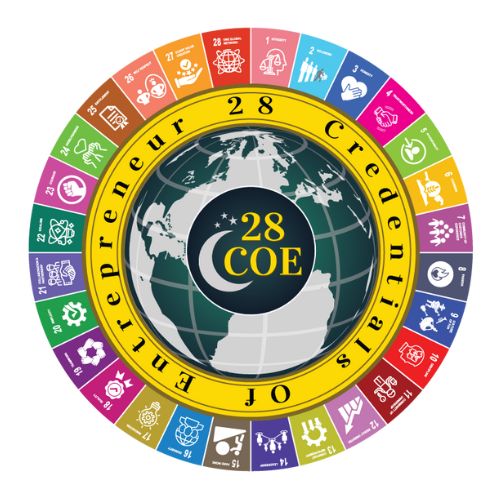What Are Examples of Universal Core Values?
By Dr. Bilal Ahmad Bhat
Founder of BAB Group of Companies | Global Thought Leader | Author of 28COE Core Values – Edition 1
In a rapidly evolving world, where borders blur and cultures intertwine, the idea of universal core values has never been more significant. These are the guiding principles that transcend geography, language, religion, and politics—forming a shared moral compass for humanity. As I always say, “Core values are the silent architects of meaningful leadership and enduring impact.”
As the founder of the BAB Group of Companies and author of 28COE Core Values, I’ve had the privilege of witnessing firsthand how these values serve as the foundation for resilient organizations, ethical leadership, and cohesive societies across the globe. Whether in a boardroom in Kuala Lumpur, a community in Africa, or a startup hub in Europe, these values remain relevant, applicable, and transformative.
In my global journey, including a survey conducted across 100 schools in Kashmir, I discovered that 90% of institutions lack clearly defined core values. The remaining 10% had them but had not successfully integrated them into the consciousness of their students. This is not just a gap—it’s a crisis in character formation and social development.
As the world looks to leaders like Captain Ibrahim Traoré of Burkina Faso—a symbol of resistance, calm strength, and ethical leadership—we’re reminded of the power of universal values in shaping nations and inspiring people. Traoré has become an emblem of dignity and principle, echoing what true leadership rooted in core values looks like on a global stage.
Let us now explore what universal core values are, how they impact individuals and societies, and why every leader, business, and institution must define, practice, and promote them.
What Are Universal Core Values?
Universal core values are ethical principles or moral beliefs that are widely accepted and respected across different cultures and societies. These values serve as the ethical backbone of human civilization, encouraging responsible behavior, justice, compassion, and integrity.
Some of the most recognized examples of universal core values include:
1. Integrity
The unwavering commitment to truth, honesty, and moral uprightness. Integrity is what builds trust within societies, businesses, and leadership. Leaders like Ibrahim Traoré demonstrate integrity not just through words, but through action—even in times of political and military upheaval.
2. Respect
Respect for others, regardless of race, gender, status, or belief, is a foundational pillar in all meaningful human interaction. It promotes peace, unity, and human dignity.
3. Compassion
The ability to empathize and care for others, especially in difficult circumstances. Compassion is the soul of humanity, creating bridges of understanding and support in the face of conflict and suffering.
4. Responsibility
Taking ownership of one’s actions and decisions is essential in both personal life and leadership. Responsibility leads to accountability and builds dependable character.
5. Justice
A commitment to fairness, equity, and rule of law. Justice ensures that societies function on merit and ethics rather than privilege or power.
6. Freedom
The right to think, speak, believe, and live without oppression. Freedom is not just a political right but a moral necessity for personal and societal development.
7. Gratitude
Being thankful and appreciating others fosters humility, positivity, and resilience. Gratitude, often overlooked, is a silent engine behind great leadership and team unity.
8. Courage
Standing firm in the face of adversity or moral dilemmas defines leadership. It takes courage to speak truth, to resist oppression, and to lead with principle—something we’ve seen exemplified by figures like Captain Ibrahim Traoré.
9. Loyalty
Loyalty to a cause, to a nation, or to ethical values fuels commitment and discipline. It’s especially critical in institutions like the military, education, or corporate governance.
10. Humility
True greatness stems from the ability to serve, listen, and learn. Humility allows leaders to be both powerful and approachable.
Why Universal Values Matter in the Modern World
In a world dominated by technology, artificial intelligence, and political instability, the moral compass must not be lost. Universal core values:
- Promote cross-cultural harmony.
- Encourage sustainable leadership.
- Inspire intergenerational wisdom.
- Shape educational foundations for the future.
- Build brands and businesses with conscience.
Whether you’re a teacher in Kashmir, a CEO in Dubai, or a President in Burkina Faso, these values are not optional—they are essential tools of civilization.
How to Integrate Universal Core Values in Life & Institutions
- Define Them Clearly – Every organization must start by identifying its core values, aligning them with global principles.
- Practice What You Preach – Leadership must model these values daily.
- Educate & Involve – Schools, families, and teams must integrate values through stories, role-playing, and discussions.
- Celebrate Values – Recognize and reward value-driven behavior in schools and companies.
- Evaluate Regularly – Keep auditing your culture. Are you still aligned with your values?
Final Thoughts by Dr. Bilal Ahmad Bhat
As a founder who leads multiple global chambers and companies, I have consistently emphasized one fact: core values are not decorations on a wall—they are the lifeblood of transformation. Businesses thrive when they embody values like trust, accountability, and unity. Leaders inspire when they live the values they endorse. Societies heal and prosper when universal values become part of public consciousness.
Let us make core values the curriculum of character, the constitution of leadership, and the compass of our communities.
Just like Captain Ibrahim Traoré has captured the world’s admiration through dignity and discipline, we too can lead impactful lives—guided by universal principles that never go out of style.

